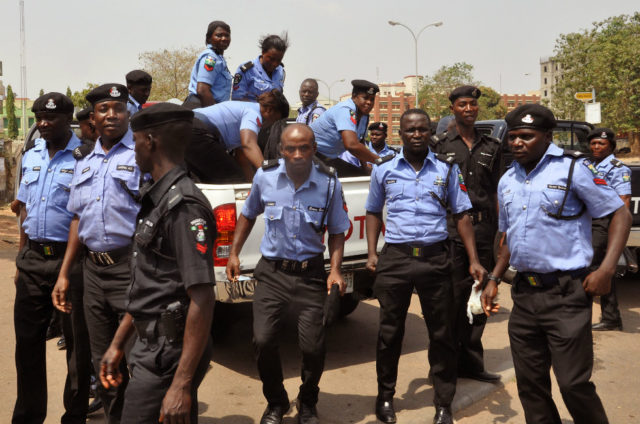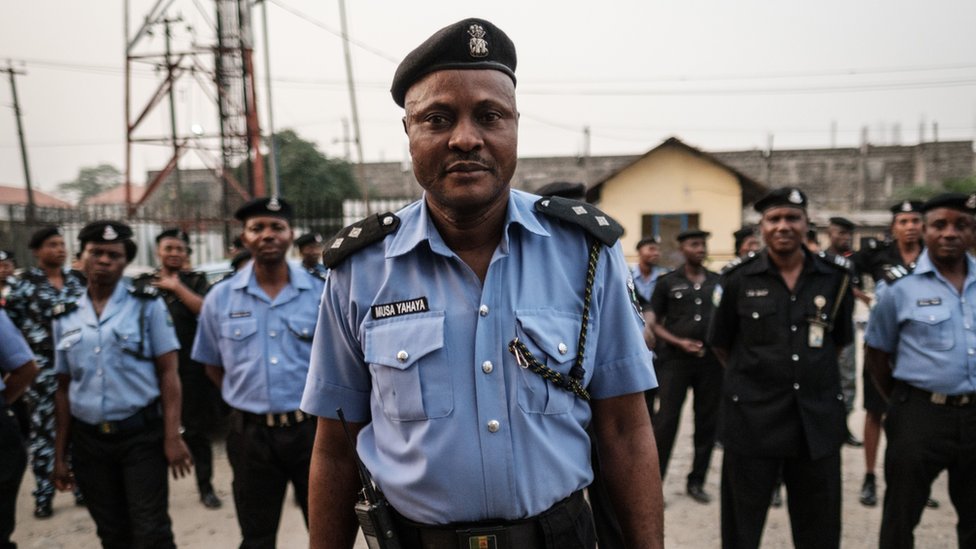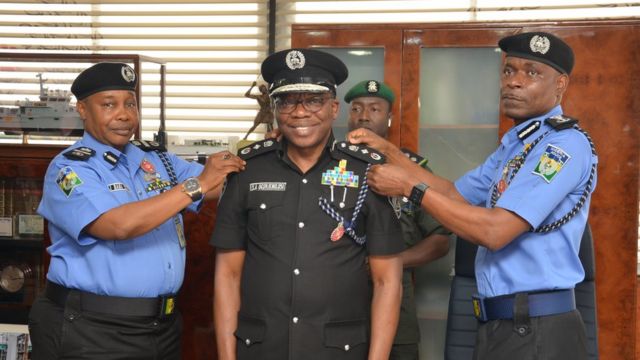Editorial Column
Policing In Nigerian: Issues And Challenges

Historically, policing and police work did not start as a paid profession, rather, it
started as a noble, incorruptible profession with considerable responsibility and distinction,
(Newburn, 2004).
However, the police as we know it today went through three distinct stages before it became a profession.

Policing
First, the populace, though small was responsible for maintaining law and order, then justice of the peace emerged on the scene to provide both the law and justice at the bar and in the present era, paid professional police were established to maintain law and order (http://www.nigeriapolice.org/history).
For Nigeria, policing was dated back to the colonial era. Policing in Nigeria has always reflected the society that created it.

Policing
In this period, the primary purpose of the police was to advance the economic and political agenda of the colonialist.
In many areas, the police engaged in the brutal subjugation of communities and the suppression of resistance to colonial rule.
Thus, the use of violence and repression from the beginning of colonial era, marked a dislocation in the relationship between the police and local communities, which has characterized law enforcement practices in Nigeria ever since.
In spite of this colonial enterprise on policing in Nigeria, the police are at the forefront of the criminal justice process and, for people, the only personal experience they have with that process is contact with a local police.
Read Also: PDP Govs Refuses Community Policing
This paper examines issues and challenges of policing in contemporary Nigeria. Put
simply, what the police do, and the quality of policing job they need to do. This is necessary in the face of increasing acts of lawlessness and social disorder in Nigeria; and perhaps in the public attitudes toward the police, which has been a major concern in Nigeria.
From pre-colonial experience, traditional African policing methods were rooted in the
community and closely interlinked with social and religious structures.

Policing
However, as the British sought colonial expansion across the territories known today as Nigeria, they established local, decentralized police forces.
The first such force was created to police the Lagos colony in 1861. Subsequent constabularies were formed in what became the northern and southern protectorate.
The composition of these police forces varied depending on location. For example, in the Lagos colony a deliberate strategy utilized officers from the linguistically and culturally distinct Hausa ethnic group from the north of the country (http://hrw.org/reports/2005/nigeria).
This practice appeared to alienate the police from the local community they were employed to control.
By contrast in the northern Nigeria protectorate a system of indirect rule depended on the Hausa chiefs and emirs, and thus the emir’s existing police system was strengthened (http://hrw.org/reports/2005/nigeria).
In 1930, the northern and southern police forces emerged into the first national police
force; called the Nigeria Police Force.
This was headed by an Inspector General of Police (IGP). The following years saw further changes in the organization of the force, such as the introduction of regional commands to reflect the federalism of Nigeria.
Responsibility for maintaining law and order was now shared by federal and regional governments.
When Nigeria became an independent country in 1960 from the British, the same
basic structures were retained.
Thus, the Independence Constitution (1960) and the Republican Constitution (1963) provided for local police force and the Nigeria Police Force.
The military seized power on 15th January 1966 and dissolved the local police forces, as a
result of negative roles attributed to the forces during the First Republic (1960-1966).
By this time, public perceptions of the police were firmly grounded in their experience of the use of the police force to extend colonial domination.
Today, Nigeria is currently having a centralized police force, as entrenched in the
1999 constitution.
Section 214 (1) of the 1999 constitution stipulates that: There shall be a Police Force for Nigeria, which shall be known as the Nigeria Police Force, and subject to the provisions of this section no other police force shall be established for the federation or any part thereof.
Issues of Policing in Nigeria
The discussion of law enforcement thus far has made it clear that not all matters of
policing in Nigeria are settled.
However, some of the issues that continue to be major topics of debate in law enforcement and have a significant impact on the quality of life in neighborhoods and communities will be highlighted.
One of such issues is discretion. Discretion is the exercise of individual judgment, instead of former rules in making decisions (Roberg, Crank & Kuykendall, 2000). In other words, the officer makes a choice concerning both what laws will be enforced and how that enforcement will take place.
The issue of police discretion is very controversial. Some believe that the discretion of police officers should be reduced.
The movement to limit the discretion of police officers is the result of abuses of that discretion, such as physical abuse of citizens or unequal application of the law in making arrests.
Other people argue that we should acknowledge that officers operate with great discretion and not attempt to limit it.
Advocates of this view believe that better education and training would help officers exercise their judgments more wisely.
Even more pertinent is the fact that some of the more critical situations involve decisions about stopping, searching, and arresting criminal suspects.
Many citizens have been inconvenienced and some have been abused because of a police
officer’s poor use of discretion in some areas in Nigeria.
In the same vein, no issue in policing has caused as much controversy in recent
times as the use of force.
In Lagos, Kaduna, Kano, Enugu, Port-Harcourt and many other cities, excessive – force charges against police officers have been made and documented and have resulted in the loss of public confidence in the police.
Not only is the persistent use of excessive force by the police against citizens unethical, civilly wrong, and criminally illegal, but it also creates a situation where nobody wins.
In fact, the scope and context of contacts between the police and citizen are largely restricted to law enforcement situations.
These are situations that citizens consider restrictive and therefore resent.
The ineffectiveness of Nigerian police, arising from the inadequacy of human resources, facilities, and funds, lowers the estimation of the police in the eyes of the public.
This conditionsalienate police from the public and engender police-citizen hostility and violence (Alemika & Chukwuma, 2000).
In the same vein, it has been observed that the Nigeria Police Force(NPF) is psychologically and structurally too distant from the people they are meant to protect; and do not share or get bound by the values, interests and sentiments of the people.
This situation stemmed from the fact of colonial origins of the Federal Police, which
adversely affected the quality of those recruited into the police, and the type of training and orientation (brutal and oppressive) they were given, all of which in turn adversely affected how (negative) they perceived and behaved towards people.
Their negative perception and treatment of Nigerians also made Nigerians not to trust or want to go near the police (Nwolise, 2012).
For many years, police followed the professional model, which rested on three foundations: preventive patrol, quick response time, and follow-up investigation.
Sensing that the professional model did not always operate as efficiently as it could, Nigeria opted to the use of community policing as been practiced all over the world.
This will help to solve both minor and major problems in a neighborhood and to reduce crime and fear of crime.
In other words, police and citizens should work cooperatively to build a strong sense of
community and should share responsibility in the neighborhood to improve the overall
quality of life within the community.
However, due to the age-long suspicious and antagonistic relationship between the police and members of the public, it has been difficult for the members of the public to accept or trust the Community Policing Project (Ayuba, 2007).
Nonetheless, a community policing perspective differs in a number of ways from a
traditional policing perspective.
For example, in community policing, the police must share power with residents of a community, and critical decisions need to be made at the neighborhood level, not at a downtown police headquarters.
Such decentralization of authority means that credit for bringing about a safer and more secure community must be shared with the people of the community, a tall order for any group of professionals to accept.
In addition, allegations leveled against the police and its personnel, some of which
have proven to be true, include arbitrariness in exercising its power, corruption, perversion of justice, and delays in the administration of justice. However, these allegations are a product of “godfatherism”.
This concept of godfatherism has become a dominant issue in Nigerian polity and impedes the course of justice across the country. Many highly placed public officers in Nigeria are known to pervert the course of justice by the virtue of their closeness to the seat of power.
Often, the police get sucked in, and this accounts for their complicity in several unresolved crimes across the country (Onyeozili, 2005). A reference point is unresolved assassinations of political figures, which the police has not fish out the
perpetrators.
This and other similar actions, rightly fuel the suspicion of police duplicity and belief that they are nothing but a bunch of hired guns in the secret service of select criminal political godfathers (Onyeozili, 2005).
In the same vein, policing system has been politicized in Nigeria. In most Nigerian
cities, party politics prevented the development of professional police departments.
Local political leaders understood that controlling the police was a means of maintaining their own political power and of allowing criminal friends and political allies to violate the law with impunity.
In fact, in some states, the police were clearly extensions of the state party machine, which attempted to dominate all activity in a community. This has been witnessed recently in Rivers State, where the Commissioner of Police has been accused of taking part in the party affairs of the state.
In collaboration with local politicians, but often on their own, the Police were more than willing to ignore violations of the law if the lawbreakers gave them money, valuables or privileges.
Similarly, human rights violations by the police have been a contested issue. One of
the major responsibilities of the government are to preserve and project the human rights of its citizens or foreign nationals.
However, the Nigerian police have consistently come under severe public criticism for its poor human rights records. This was most pronounced in the years of military rule with its usual castration of the rule of law, which foisted a Utopian character on the people’s demand for the protection of human rights (Ayuba & Ajewole, 2007).
Despite continuous attempts by successive police administrators to change the human rights image of the force, the notion persists among members of the public that the Nigerian police has very scant regard for the civil rights of the average citizen. Police corruption is another issue.
Almost from the beginning of formal policing in Nigeria, corruption of law enforcement officers has been a fact of life. Throughout history, police officers have bought their positions and promotions, sold protection, and ignored violations of the law for money. Why is policing so susceptible to bribery and other forms of corruption in Nigeria? Basically, this has to do with a combination of two critical features of the police role in the society.
On the one hand, the police have authority to enforce laws and to use power to make sure that those laws are obeyed. On the other hand, they also have the discretion not to enforce the law. The combination of those two features makes the police vulnerable to bribes and other forms of corruption.
In this context, allegations of police corruption erupt on daily basis. These come in various forms: extortion from motorists at illegally mounted roadblocks, collection of monetary gratification (bribery) in order to alter justice in favor of the highest bidder. The dismissal of the former I.G. Tafa Balogun on January 17, 2005, on the corruption–laden charges which has brought out many of his bloody deals to the open leaves much to be desired in terms of police image.
Challenges of Policing in Nigeria
In this century, policing in Nigeria faces a lot of challenges. Thus, police work requires a combination of special characteristics. But personnel with the following qualities: quick decision-making, independent nature of police work, dirty work and danger are best able to carry out the difficult service role mandated for law enforcement officers.
However, the spate of armed robbery is posing a big challenge to effective policing in Nigeria.
Why the police have been trying to curb this menace, the ill-equipped officers and outdated weapons have rendered their role in this direction unattainable. Of recent, the IG cried for improved bullet proof for officers attached to the banks.
Yet, nothing has been done, therefore, the Nigerian Police should equip the officers with modern and sophisticated weapons.
Similarly, human trafficking has become a recurring decimal in Nigeria. However, the
Nigeria Police Force being the principal law enforcement organization in the country is
naturally positioned to intervene in issues of human trafficking.
This intervention should translate into the prevention, apprehension, investigation, and prosecution of cases of trafficking in persons. Although, the police have recorded a lot of success in this aspect of policing, but a lot of challenges still exist for a comprehensive success of this issue.
Foremost among the problems encountered in the process was the attitude of the victims.
Their uncooperative attitude is occasioned by the fearful oaths of secrecy forced on them by the traffickers and in whose efficacy, they believe without hesitation.
Also lack of proper coordination of anti-human trafficking units occasioned by lack of effective communication amongst the twelve units spread around the country has militated against the progress of the unit (Gimba, 2007).
Policing in Nigeria is not limited to domestic affairs. The Nigeria Police has participated in international peacekeeping operations. This gesture gave Nigeria the impetus to be ranked first in the UN Peace-Keeping Female Contributing Countries. Nigeria also boasts of five Nigeria police officers on the UN appointments (Owohunwa, 2007).
However, the challenge faced in this area is the deployment difficulties. Countries have
been known to refuse unhindered passage of arms and ammunition through their territories.
In addition, there is a language barrier. The obvious difficulties confronting Nigerian PeaceKeepers in non-English speaking countries are compounded by social and cultural
differences, which make it imperative for the best available men and women to be deployed
for peace-keeping duties.
Recent identification development in criminal investigation is another challenge of
policing in Nigeria.
Two of the most significant advances in criminal investigation have been the development of fingerprinting and DNA profiling.
While this has been working perfectly in advance countries like US and Britain, to the arrest and conviction of millions of criminals’ suspects, the Nigerian case is pathetic. Although, the Nigeria police are trained up to this scientific level, but the challenge is that the Federal Government are not procuring the instrument for the police to display their work.
Other challenges of policing in Nigeria include proper remuneration of officers so that
the job can be attractive, recruitment of educated men and women, adequate funding and
budgetary allocation, language barrier among ethnic nationalities, especially among the
illiterates, which hindered police investigation and many others.
Advertise or Publish a Story on EkoHot Blog:
Kindly contact us at [email protected]. Breaking stories should be sent to the above email and substantiated with pictorial evidence.
Citizen journalists will receive a token as data incentive.
Call or Whatsapp: 0803 561 7233, 0703 414 5611






